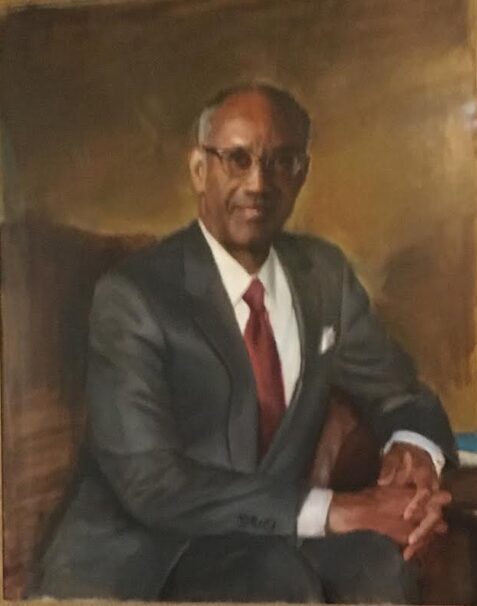In 1986, during my first year at Dartmouth College, I had the good fortune to take a seminar on Black Theatre with Professor Errol Hill (1921-2003).[1] More than thirty years later I still count myself lucky to have had my introduction to the history of Black Theatre under Errol’s guidance. His rigorous scholarship and penetrating questions helped to set the standards for my own further explorations of Black Theatre History over the coming years, and I still remember our final chat many years later at a 2002 ASTR conference when he was asking me about the progress of my new book on slavery and US theatre.
Errol would have been 100 years old this year. A century after his birth, he still stands as one of the giants in the field of Black Theatre scholarship. His landmark History of African American Theatre with Jim Hatch (1929-2020), his work as a playwright, his foundational study, Shakespeare in Sable, his pioneering book, The Jamaican Stage, 1655-1900, his many edited collections of plays by Black dramatists, as well as his monumental Theatre Collection, now housed at Dartmouth College—all of these contributions have shaped the development of the field in innumerable ways for thousands of scholars and students who never had the chance to meet him. For those who did have the chance to work with him, his mentorship proved equally invaluable—generous and exacting in equal measure. The award that bears his name with the American Society for Theatre Research has recognized more than thirty outstanding works in Black Theatre since its launch in 1997. (The list of those winners is included in the Book Review section of this issue and can also be found on the ASTR website at astr.org.)
What I miss most—even thirty-five years after our first encounter in Hanover, NH—is the bellow of laughter that would erupt from this most dignified and handsome of men, transforming him into a joyous figure always ready to welcome new colleagues to the field. I spoke recently with his wife, Grace Hope Hill—his partner in his life, his research, his theatrical productions, and over many years of travel and adventure. I said how much I still missed his laugh. Grace exclaimed, “His laugh was so loud.” She also shared a story of Errol’s early days that links to so many of the themes shared in this issue about the need to support and document Black Theatre. In the 1950s, the University of the West Indies in Jamaica received a 300£ donation from a British bookstore owner (at Foyles Bookshop) and Errol, then serving as a “Drama Tutor” in the program, headed out into communities across Jamaica to develop new works by regional authors. As Grace recalls, “He helped with the writing, directing, and acting… We worked with very limited funds and did everything ourselves. Errol was so passionate that he brought everyone along with him.”
That statement sums up Errol’s contribution to Black Theatre Studies so beautifully – for both those who knew him and those who never had the chance to meet him, “He was so passionate that he brought everyone along with him.” Help us celebrate Errol’s legacy in this issue dedicated to Black Theatre. Honor the innumerable artists and scholars who have created and documented the field of Black Theatre for more than two centuries of passionate work and those who are propelling it forward into the future.
Ronald N. Sherr, “Errol G. Hill,” oil on panel, Dartmouth College
[1] For more on Errol’s extraordinary career, including his time with the Royal Academy of Dramatic Arts, Yale University, Dartmouth College, as a professional actor and playwright, and as an accomplished scholar, see the link to his papers now housed at Dartmouth College: https://archives-manuscripts.dartmouth.edu/agents/people/1185.
by Heather S. Nathans
Tufts University
The Journal of American Drama and Theatre
Volume 33, Number 2 (Spring 2021)
ISNN 2376-4236
©2021 by Martin E. Segal Theatre Center





